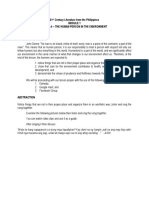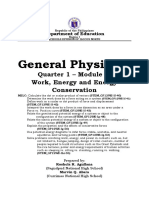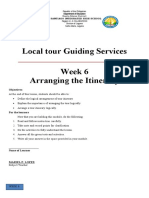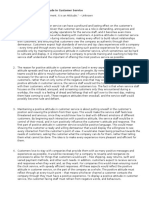Introduction To The Philosophy of Human Person Module 3-Week 3 The Human Person As Embodied Spirit
Uploaded by
Mariel Lopez - MadrideoIntroduction To The Philosophy of Human Person Module 3-Week 3 The Human Person As Embodied Spirit
Uploaded by
Mariel Lopez - MadrideoRepublic of the Philippines
Department of Education
Santa Maria District
J. SANTIAGO INTEGRATED HIGH SCHOOL
Region IV- A CALABARZON
Division of Laguna
Santa Maria, Laguna
Introduction to the Philosophy of
Human Person
_____________________________________
Module 3- Week 3
The Human Person as embodied
Spirit
Objectives:
By the end of this lesson, you are expected to:
1. Recognize one’s limitations and possibilities
2. Evaluate one’s limitations and the possibilities for their transcendence
3. Recognize how the human body imposes limits and possibilities for transcendence
4. Distinguish the limitations and possibilities for transcendence.
For the learners
Now that you are holding this module, do the following:
1. Read and follow instruction carefully.
2. Take note and record points for clarification
3. Do the activities to fully understand the lesson.
4. Answer all the given tests and activities.
5. Write all your answer in the space provided in your activity sheet.
HUMAN COMPOSITION OF MAN
MAN (from Wikipedia, the free encyclopedia) The English term “man” is derived from a Proto-Indo European root *man
- (see Sanskrit/Avestan Manu-, Slavic mǫž "man, male"). It is the general term commonly used to refer to the entire
human race. Other related terms, humanity, mankind, and humankind.
HUMAN NATURE defines as the nature of humans especially the fundamental characters and traits of humans. It refers
to the characteristics that distinguish humans from all other creatures. These traits are expected to arise independent of the
influence of culture and society. EXAMPLES: THINKING, FEELING AND ACTING. refers to man as species – HOMO
SAPIENS or MODERN HUMAN BEINGS. The term human being is also used to differentiate man from other animals.
PERSON is the personality of a human being so called “SELF”. Refers to a human being granted recognition of certain
rights, protection, responsibilities and dignity above all. Philosopher refers to the human person as the totality of an
individual, possessing awareness, self-determination and capacity to interact with others and with himself/herself.
Personhood refers to the state of being a person.
HUMAN NATURE defines as the nature of humans especially the fundamental characters and traits of humans. It refers
to the characteristics that distinguish humans from all other creatures. These traits are expected to arise independent of the
influence of culture and society. EXAMPLES: THINKING, FEELING AND ACTING.
Self-awareness refers to the person having a clear perception of oneself, including his thoughts, emotions, identity and
actions.
Try saying these!
● I am a person.
● I am alive.
● I exist.
● I am here. I am present.
● I am living at this very moment.
Let’s examine
Little Jose is playing in the living room while his mom is in the kitchen. He accidentally bumps into a table,
causing a vase to fall. Upon hearing, his mom went to the living room and saw him, standing near the broken vase. She
asked, “Did you break the vase?” What do you think Jose‘s answer will be?
Self-determination refers to the capability of persons to make choices and decisions based on their own preferences,
monitor and regulate their actions, and be goal-oriental and self-directed.
Consequence is the result or effect of an action or condition. Philosophers believe that a person acts freely and with due
regard for the consequences of his actions.
Externality refers to the capability of a person to reach out and interact with others and the world.
Dignity refers to the innate right to be valued and respected. Philosophers consider all humans as having an inherent
worth or value. “You’re worthless!” is an insult since it attacks the very notion of a person having value or worth.
Limitations of the Human Person
Human persons are naturally deficient beings. This means that we are not prepared with the best physical aspects
among all the beings.
Human persons do not have the natural ability to fly.
The Body as Intermediary
Intermediary means acting as a mediator (Merriam-Webster). Having a body may prevent us from revealing what
we really want to express.
How do we communicate with each other? WORDS
But can words really capture the things we want to express? But this limitation can also be an advantage...
In most cases, words are not enough. EXAMPLE: Magbabago Na Ako Promise!!!
Let us find out the answers in this lesson!
The previous example talks about transcendence or a state of “existence above and beyond the limits of material
experience.”
Transcendence originated from the words Trans, meaning “go beyond”, and scandare, meaning “climb”.
In the example, fulfilling a dream requires transcendence because it opens a state of thinking and feeling that there is
something more in life than just physical and material things. Much like Abraham Maslow’s self-actualization concepts,
transcendence is a state of being intrinsically satisfied with life regardless of physical and tangible factors.
● LIMITATIONS AND POSSIBILITIES FOR TRANSCENDENCE
Here are some limitations and possibilities for transcendence:
- may not occur to everyone
- does not come at a specified period
- varies across all people
- may coincide with physical limitations of the body
- developing a positive outlook in life
- working towards reaching a goal
- learning from experience
● POSSIBILITIES FOR TRANSCENDENCE
It is also important to know that transcendence may be applied to present worries by living in the present. This
means that life is lived from moment to moment in a carefree and cheerful manner where concerns for stress are reserved
for the future, and regrets or guilt feelings are kept in the past.
● THE HUMAN BODY IN IMPOSING LIMITS AND POSSIBILITIES
From a biological and physical standpoint, it can be recognized that the human body, although it can perform
many functions, also has limitations. Limits in the environment, demographics, and society may also hinder a person from
reaching transcendence.
Here are some examples:
BODILY LIMITATIONS
- mental and emotional disorders (e.g. anxiety, intellectual disability)
- disabilities (e.g. amputated leg, deafness)
- disease and illnesses (e.g. hypertension, cough)
- failures and experiences (e.g. failing a subject)
SOCIAL AND ENVIRONMENTAL LIMITATIONS
- socioeconomic status
- location of neighborhood (e.g. armed, disorganized, or violent neighborhood)
- abusive relationships (e.g. emotional abuse) negative influences (e.g.
● OVERCOMING LIMITATIONS
Bodily limits can be tested by trying on new experiences and working on challenges with increasing levels of
difficulty. The human body, if given enough exposure to any situation, can attain a goal with efficiency. Social and
environmental limitations are more difficult to overcome than bodily limitations because they involve the influence of
other people and the external world. However, with a proper mindset, clearly defined goals, and motivation to rise above
challenges, one may successfully overcome his or her limitations.
● RECOGNIZE AND EVALUATE OWN LIMITATIONS AND POSSIBILITIES FOR TRANSCENDENCE
Even though you are still young, you are not prevented from further understanding yourself. Transcendence is
even more possible when you begin to understand that you can go beyond your limitations if you set your mind on your
goals.
SOME POINT TO REMEMBER WHEN GOING BEYOND YOUR LIMITS
- you are connected to the external or eternal world
- challenges are learning opportunities
- your goal is more important than your fears
- think outside the box - recognize that everyone has fears
TIPS
The terms “transcendent” and transcendental” should not be used interchangeably. According to Immanuel Kant,
“transcendent” is a term used to refer to God, while “transcendental” refers to all other matter.
While transcendence may not occur for everyone, all people have the capacity to experience it regardless of any
sociodemographic, biological, or personal factors.
You might also like
- Sister Letty Kuan: Retirement and Role Discontinuities83% (6)Sister Letty Kuan: Retirement and Role Discontinuities22 pages
- Toaz - Info Module 3 Introphilo11 q1 Mod3 The Human Person As An Embodied Spirit Version 3p PRNo ratings yetToaz - Info Module 3 Introphilo11 q1 Mod3 The Human Person As An Embodied Spirit Version 3p PR13 pages
- Department of Education: Republic of The Philippines100% (2)Department of Education: Republic of The Philippines13 pages
- Introduction To The Philosophy of The Human Person 4 Done PDFNo ratings yetIntroduction To The Philosophy of The Human Person 4 Done PDF8 pages
- MELC 7 Introduction To Philosophy of The Human Person Activity Sheet 1 1No ratings yetMELC 7 Introduction To Philosophy of The Human Person Activity Sheet 1 18 pages
- Is Bad Language Unacceptable On TV Activity0% (3)Is Bad Language Unacceptable On TV Activity16 pages
- Introduction To Philosophy of The Human Person: Quarter 1 - Week 7 - Module 7-8: LessonNo ratings yetIntroduction To Philosophy of The Human Person: Quarter 1 - Week 7 - Module 7-8: Lesson8 pages
- To The Philosophy of The Human Person: Quarter 1 - Module 2No ratings yetTo The Philosophy of The Human Person: Quarter 1 - Module 227 pages
- Introduction To Philosophy of The Human PersonNo ratings yetIntroduction To Philosophy of The Human Person20 pages
- SLM G12 Week 1 Meaning and Process of Philosophy100% (1)SLM G12 Week 1 Meaning and Process of Philosophy13 pages
- Human Person in Their Environment (Philosophy)No ratings yetHuman Person in Their Environment (Philosophy)4 pages
- Emmanuel Kant and Patricia Churchland Perception of Self0% (2)Emmanuel Kant and Patricia Churchland Perception of Self7 pages
- LO WEEK 6 IPHP Q1 W7 8 The Human Person and The Environment Gualdo Benguet DeletedNo ratings yetLO WEEK 6 IPHP Q1 W7 8 The Human Person and The Environment Gualdo Benguet Deleted10 pages
- Holistic Point of View Partial Point of ViewNo ratings yetHolistic Point of View Partial Point of View2 pages
- English For Academic and Professional Purposes: Department of EducationNo ratings yetEnglish For Academic and Professional Purposes: Department of Education13 pages
- Week 5 - Q2 M5 - Freedom of The Human Person100% (1)Week 5 - Q2 M5 - Freedom of The Human Person45 pages
- Lesson 1 Understanding and Appreciating The Interplay of UCSPNo ratings yetLesson 1 Understanding and Appreciating The Interplay of UCSP30 pages
- Philosophy of The Human Person Q2 Week 1No ratings yetPhilosophy of The Human Person Q2 Week 110 pages
- The Use of Mobile Dictionary Traditional Dictionary in The Academic Performance of ICT12-2 Students For The SY:2019-2020No ratings yetThe Use of Mobile Dictionary Traditional Dictionary in The Academic Performance of ICT12-2 Students For The SY:2019-202011 pages
- GenPhys1-12-Q1-Week6-Mod6-MELC - Agullana, Roshela R. - Abara, Marvin Q. - ROSHELA AGULLANANo ratings yetGenPhys1-12-Q1-Week6-Mod6-MELC - Agullana, Roshela R. - Abara, Marvin Q. - ROSHELA AGULLANA32 pages
- Final SHS 12 Intro. To Philosophy Q1 Module 4No ratings yetFinal SHS 12 Intro. To Philosophy Q1 Module 48 pages
- Supplementary Learning Modules For Senior High School LearnersNo ratings yetSupplementary Learning Modules For Senior High School Learners14 pages
- PDF (SG) - Eap 11 - 12 - Unit 3 - Lesson 1 - What Is A SummaryNo ratings yetPDF (SG) - Eap 11 - 12 - Unit 3 - Lesson 1 - What Is A Summary21 pages
- Introduction To The Philosophy of The: Human Person40% (5)Introduction To The Philosophy of The: Human Person8 pages
- Module 3: Intellectual Revolutions and SocietyNo ratings yetModule 3: Intellectual Revolutions and Society4 pages
- Introduction To Philosophy - Authentic Dialouge and Its BarriersNo ratings yetIntroduction To Philosophy - Authentic Dialouge and Its Barriers2 pages
- Lesson 4.3 Literary Reading Through A Linguistic ContextNo ratings yetLesson 4.3 Literary Reading Through A Linguistic Context2 pages
- Raja Soliman Science and Technology High SchoolNo ratings yetRaja Soliman Science and Technology High School2 pages
- The Case for Masks: Science-Based Advice for Living During the Coronavirus PandemicFrom EverandThe Case for Masks: Science-Based Advice for Living During the Coronavirus PandemicNo ratings yet
- Narrative Report On Orientation On Child MappingNo ratings yetNarrative Report On Orientation On Child Mapping4 pages
- Department of Education: Republic of The PhilippinesNo ratings yetDepartment of Education: Republic of The Philippines3 pages
- Daily Lesson Log: MARCH 2-6, 2020 10:00-11:00-11:00-12:00No ratings yetDaily Lesson Log: MARCH 2-6, 2020 10:00-11:00-11:00-12:003 pages
- Region Iv-A Calabarzon: J. Santiago Integrated High SchoolNo ratings yetRegion Iv-A Calabarzon: J. Santiago Integrated High School2 pages
- Importance of A Positive Attitude in Customer ServiceNo ratings yetImportance of A Positive Attitude in Customer Service8 pages
- Berling - Defendant Gravity Diagnostics' Motion For Summary Judgment Filed 8-19-21No ratings yetBerling - Defendant Gravity Diagnostics' Motion For Summary Judgment Filed 8-19-2199 pages
- The Impact of Signature Character Strengths Interventions: A Meta AnalysisNo ratings yetThe Impact of Signature Character Strengths Interventions: A Meta Analysis18 pages
- English Language School Based AssessmentNo ratings yetEnglish Language School Based Assessment7 pages
- Rights of Women in Prison: Addressing Gender IssuesNo ratings yetRights of Women in Prison: Addressing Gender Issues39 pages
- Mindfulness for Anger Management Transformative Skills for Overcoming Anger and Managing Powerful Emotions 1st Edition Stephen Dansiger 2024 Scribd Download100% (1)Mindfulness for Anger Management Transformative Skills for Overcoming Anger and Managing Powerful Emotions 1st Edition Stephen Dansiger 2024 Scribd Download55 pages
- bateman-2021-mentalizing-and-group-psychotherapy-a-novel-treatment-for-antisocial-personality-disorderNo ratings yetbateman-2021-mentalizing-and-group-psychotherapy-a-novel-treatment-for-antisocial-personality-disorder6 pages
- Welcome To Rapture: The Bioshock RPG: Bioshock RPG, Revision 1 Author: Stanton Kirk Potential ChangesNo ratings yetWelcome To Rapture: The Bioshock RPG: Bioshock RPG, Revision 1 Author: Stanton Kirk Potential Changes17 pages
- Sister Letty Kuan: Retirement and Role DiscontinuitiesSister Letty Kuan: Retirement and Role Discontinuities
- Toaz - Info Module 3 Introphilo11 q1 Mod3 The Human Person As An Embodied Spirit Version 3p PRToaz - Info Module 3 Introphilo11 q1 Mod3 The Human Person As An Embodied Spirit Version 3p PR
- Department of Education: Republic of The PhilippinesDepartment of Education: Republic of The Philippines
- Introduction To The Philosophy of The Human Person 4 Done PDFIntroduction To The Philosophy of The Human Person 4 Done PDF
- MELC 7 Introduction To Philosophy of The Human Person Activity Sheet 1 1MELC 7 Introduction To Philosophy of The Human Person Activity Sheet 1 1
- Introduction To Philosophy of The Human Person: Quarter 1 - Week 7 - Module 7-8: LessonIntroduction To Philosophy of The Human Person: Quarter 1 - Week 7 - Module 7-8: Lesson
- To The Philosophy of The Human Person: Quarter 1 - Module 2To The Philosophy of The Human Person: Quarter 1 - Module 2
- Emmanuel Kant and Patricia Churchland Perception of SelfEmmanuel Kant and Patricia Churchland Perception of Self
- LO WEEK 6 IPHP Q1 W7 8 The Human Person and The Environment Gualdo Benguet DeletedLO WEEK 6 IPHP Q1 W7 8 The Human Person and The Environment Gualdo Benguet Deleted
- English For Academic and Professional Purposes: Department of EducationEnglish For Academic and Professional Purposes: Department of Education
- Lesson 1 Understanding and Appreciating The Interplay of UCSPLesson 1 Understanding and Appreciating The Interplay of UCSP
- The Use of Mobile Dictionary Traditional Dictionary in The Academic Performance of ICT12-2 Students For The SY:2019-2020The Use of Mobile Dictionary Traditional Dictionary in The Academic Performance of ICT12-2 Students For The SY:2019-2020
- GenPhys1-12-Q1-Week6-Mod6-MELC - Agullana, Roshela R. - Abara, Marvin Q. - ROSHELA AGULLANAGenPhys1-12-Q1-Week6-Mod6-MELC - Agullana, Roshela R. - Abara, Marvin Q. - ROSHELA AGULLANA
- Supplementary Learning Modules For Senior High School LearnersSupplementary Learning Modules For Senior High School Learners
- PDF (SG) - Eap 11 - 12 - Unit 3 - Lesson 1 - What Is A SummaryPDF (SG) - Eap 11 - 12 - Unit 3 - Lesson 1 - What Is A Summary
- Introduction To The Philosophy of The: Human PersonIntroduction To The Philosophy of The: Human Person
- Introduction To Philosophy - Authentic Dialouge and Its BarriersIntroduction To Philosophy - Authentic Dialouge and Its Barriers
- Lesson 4.3 Literary Reading Through A Linguistic ContextLesson 4.3 Literary Reading Through A Linguistic Context
- A Study Guide for Hamsad Rangkuti's "The Fence"From EverandA Study Guide for Hamsad Rangkuti's "The Fence"
- The Case for Masks: Science-Based Advice for Living During the Coronavirus PandemicFrom EverandThe Case for Masks: Science-Based Advice for Living During the Coronavirus Pandemic
- Department of Education: Republic of The PhilippinesDepartment of Education: Republic of The Philippines
- Daily Lesson Log: MARCH 2-6, 2020 10:00-11:00-11:00-12:00Daily Lesson Log: MARCH 2-6, 2020 10:00-11:00-11:00-12:00
- Region Iv-A Calabarzon: J. Santiago Integrated High SchoolRegion Iv-A Calabarzon: J. Santiago Integrated High School
- Importance of A Positive Attitude in Customer ServiceImportance of A Positive Attitude in Customer Service
- Berling - Defendant Gravity Diagnostics' Motion For Summary Judgment Filed 8-19-21Berling - Defendant Gravity Diagnostics' Motion For Summary Judgment Filed 8-19-21
- The Impact of Signature Character Strengths Interventions: A Meta AnalysisThe Impact of Signature Character Strengths Interventions: A Meta Analysis
- Rights of Women in Prison: Addressing Gender IssuesRights of Women in Prison: Addressing Gender Issues
- Mindfulness for Anger Management Transformative Skills for Overcoming Anger and Managing Powerful Emotions 1st Edition Stephen Dansiger 2024 Scribd DownloadMindfulness for Anger Management Transformative Skills for Overcoming Anger and Managing Powerful Emotions 1st Edition Stephen Dansiger 2024 Scribd Download
- bateman-2021-mentalizing-and-group-psychotherapy-a-novel-treatment-for-antisocial-personality-disorderbateman-2021-mentalizing-and-group-psychotherapy-a-novel-treatment-for-antisocial-personality-disorder
- Welcome To Rapture: The Bioshock RPG: Bioshock RPG, Revision 1 Author: Stanton Kirk Potential ChangesWelcome To Rapture: The Bioshock RPG: Bioshock RPG, Revision 1 Author: Stanton Kirk Potential Changes


















































































































